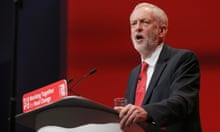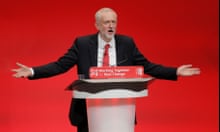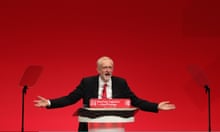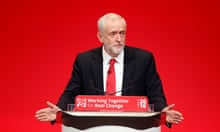In her speech Diane Abbott is saying Labour is the only party that can save the NHS. She has also set out her thinking today in an article for the Guardian.
Labour conference: Tom Watson says capitalism is not the enemy - as it happened
Rolling coverage of all the developments from the Labour conference in Liverpool, including speeches from Sadiq Khan and Tom Watson
Tue 27 Sep 2016 13.15 EDT
First published on Tue 27 Sep 2016 04.05 EDT- Tom Watson's speech - Summary
- Jeremy Corbyn's interviews - Summary
- Angela Rayner vows to fight extending grammar schools with 'every breath in my body
- Paul Flynn urges Labour MPs to return to the front bench
- Sadiq Khan's speech - Summary and analysis
- Diane Abbott says Labour would restore bursaries for student nurses
- The 15 national executive rule changes - Details
- Labour conference backs call for possible referendum on final Brexit deal
Live feed
- Tom Watson's speech - Summary
- Jeremy Corbyn's interviews - Summary
- Angela Rayner vows to fight extending grammar schools with 'every breath in my body
- Paul Flynn urges Labour MPs to return to the front bench
- Sadiq Khan's speech - Summary and analysis
- Diane Abbott says Labour would restore bursaries for student nurses
- The 15 national executive rule changes - Details
- Labour conference backs call for possible referendum on final Brexit deal
Diane Abbott, the shadow health secretary, is addresssing the party conference now. I will post a summary of her speech in a moment.
Shadow health secretary Diane Abbott set to address #Lab16. Jeremy Corbyn currently sat next to her. pic.twitter.com/7XOLRCinY8
— Jack Maidment (@jrmaidment) September 27, 2016
Here are three articles from today’s papers about the conference that are worth reading.
First, a group of them (which included Sadiq Khan) nominated Corbyn for the leadership on the assumption that he could never win it – one of the biggest misjudgements since Stalin was accepted as general secretary of the Soviet Communist Party in 1922 because he posed no threat to his colleagues
Second, the open challenge to Corbyn’s leadership was launched too soon. In the Conservative Party, where the overthrow of leaders is an art form nurtured and treasured over two centuries, we would never have made this error. The rule of thumb is that it takes a good two years for a party to despair even of a very unsuccessful leader. By jumping the natural starting gun, the moderates left some Labour members able to say that their leader was still new and hadn’t been given a chance.
Third, that premature challenge was not spearheaded by a real alternative. Owen Smith was not only unprepared for the fight but offered merely a less doctrinaire version of Corbyn himself, rather than a different vision of Labour’s future. Thus the central argument about the whole direction of the party was never fought out, and the leadership election actually shifted the terms of Labour’s debates further to the Left.
Ironically, on one point at least, Hague’s analysis is identical to John McDonnell’s. McDonnell famously said the Labour plotters had been “fucking useless”.
The truth is that Labour’s biggest problem is not Mr Corbyn himself but the fact that the world has moved on and the party has not. Although its battles are conducted on Twitter and Facebook, it is still an analogue organisation in a digital age. Even its name looks like an anachronism. This is a party of “the workers”, which grew out of the trade union movement but which has failed spectacularly to understand that the nature of work has changed over the past 30 years.
The number of self-employed people is predicted to overtake public sector workers by 2018 as the internet transforms the way business is done. About 16 per cent of people in this country now work for themselves — up from 8.7 per cent in 1975 — and it’s a trend that will only accelerate with the rise of automation.
The self-employed will be an ever more powerful economic and political force, but Labour has nothing to say to these voters. Its policies on full employment or workers’ rights are irrelevant to them and its statist solutions are likely to be anathema to this instinctively individualistic group. These are not all thrusting entrepreneurs setting out to become millionaires by setting up their own companies. Many are freelancers cobbling together jobs, or people making a part-time living through the sharing economy — Uber drivers or those renting out a room on Airbnb. To the extent that it thinks about them at all, Labour sees them as victims of corporate exploitation, but many like the flexibility and control they get from being their own boss. They do not think of themselves as “the workers”; in fact work is not their defining identity at all.
[Rayner’s] combative Commons displays on the subject have seen her become a front-bench favourite of Labour members.
And the passion she exudes for education and the party will ensure a packed hall for her speech today.
It will be a very different reception to the “sneer of arrogance” she has encountered from the Tory benches since taking the role. “I think some of them think: ‘What does she know, she wasn’t educated, she says it herself.
“But actually I’ve got a masters in real life and I know from the evidence this is bad for our kids.”
In the debate on the NEC rule changes Mike Katz, from the Jewish Labour Movement, complained that the party was not doing more to tackle antisemitism. He told delegates:
Conference, I don’t want to be here because I wish there hadn’t been an upsurge in antisemitics, Islamophobic, misogynistic and homophobic vile hate speech in our party, even here, in our exhibitions and on our fringe, I’m sad to report. Jeremy [Corbyn] has said it, Tom [Watson] has said it, we have all said it; there is no place for this in our party. We must root it out.
Against this backdrop, is there any wonder that support for Labour amongst British Jews is said to be as low as 7%. It makes me weep; the party of Manny Shinwell, the party that has done more than any other to promote tolerance and inequality, the party to which the Jewish Labour Movement has been affiliated since 1920, is not seen as a welcoming home for Jews.
Katz said that Corbyn had acted to address antisemitism, but he said that measures to specifically tackle antisemitism should have been included in the rule changes being voted on today.
The 15 national executive rule changes - Details
The national executive committee’s rule changes are controversial because they include plans to let the Labour leaders in Scotland and Wales nominate one person each to sit on the NEC. Kezia Dugdale, the Scottish leader, and Carwyn Jones, the Welsh leader, are both seen as opponents of Jeremy Corbyn, and Corbynites fear this rule change will result in the anti-Corbyn faction on the NEC getting too extra votes. Currently Corbyn has a small majority on the NEC on some issues, but it is finally balanced. The Corbynites wanted the new Scottish and Welsh NEC representatives to be chosen by party members, which would probably have led to Corbyn supporters being elected.
But some of the other changes are quite significant. Here is a full list of what they are.
1 - Clarification that a sitting leader does not need to be nominated by 20% of MPs and MEPs to stand in a leadership election if challenged. This change is being introduced because the current rules are ambiguous. Labour’s NEC decided that Corbyn could stand in the leadership contest without getting fresh nominations, but because the rules were not 100% clear, a Labour member took the party to court in an unsuccessful attempt to get that decision overturned.
2 - Clarification of for how long someone needs to have paid affiliation fees to attend a CLP AGM (60 days).
3 - Tightening of rules allowing the party to exclude people convicted of serious offences from joining, to include people subject to rulings from civil courts relating to their behaviour. This is intended to ensure Labour can exclude people who might be a threat to children but who have not been convicted of a criminal offence.
4 - Giving the national women’s conference a formal role in policy making.
5 - Toughening up penalties for Labour groups that do not follow gender balance rules.
6 - Banning Labour councillors from voting for an illegal budget.
7 - Obliging Labour mayors and police and crime commissioners to report to Labour organisations and conferences.
8 - Changing the way Labour councillors pay a levy to the party.
9 - Adding two members to the NEC, a frontbench member of the Scottish parliament nominated by the Scottish leader and a frontbench member of the Welsh assembly nominated by the Welsh leader.
10 - Allowing the Scottish and Welsh leaders to attend the Clause 5 meetings that determine the party’s election manifesto.
11- Putting the Scottish and Welsh executives in charge of deciding their own Westminster candidates.
12 - Putting the Scottish and Welsh executives in charge of setting rules for the selection of candidates for the devolved bodies.
13 - Putting the Scottish and Welsh executives in charge of setting rules for the selection of council candidates in Scotland and Wales.
14 - Formalising the posts of Scottish deputy leader and Welsh deputy leader.
15 - Formalising the new rule changes affecting Scotland and Wales.
At the Labour conference Andy Kerr, a member of the national executive committee, is now opening the main debate on the proposed national executive committee rule changes.
Paddy Lillis, the NEC chair who is chairing this morning’s session, called a vote on a show of hands on whether to agree a “reference back” so that delegates could vote on all 15 proposed rule changes separately. There were loud protests when he did not agree a card vote, but Lillis said there was a clear majority against a reference back. Manuel Cortes, the TSSA general secretary who proposed a reference back, then came to the stage to protest, saying party rules said there should be a card vote. Lillis over-ruled him, saying it was clear from the show of hands who won.
Now that’s over it is seems certain that the proposed rule changes will be agreed quite comfortably.
The Labour conference has opened, and there will be a debate on the proposed changes to party rules (including giving Scotland and Wales a seat on the national executive committee). But, being the Labour party, at first they are having a debate about who to hold the vote. Labour HQ wants a single ‘take it or leave it’ vote on all 15 proposed rule changes. But some delegates are now arguing for individual votes on each measure.
Labour conference backs call for possible referendum on final Brexit deal
There were not many policy issues that divided Jeremy Corbyn and Owen Smith during the leadership contest but one was Europe. Corbyn said the party should accept the Brexit vote, and focus on getting the best possible deal. Smith said that any final deal should be put to the public, in a second referendum or a general election, and that he would like the UK to stay in the EU.
Interestingly, the Labour party conference has backed the Owen Smith position. There has not been a formal debate on Brexit at the conference, but yesterday’s economy debate included various composite motions on employment rights, including one proposed by the TSSA union. It was passed unanimously, and no one paid much attention to the detail, but it included a line saying the UK should retain the option of staying in the EU.
Here is the key passage.
[Conference] recognises that many of those who voted to leave the EU were expressing dissatisfaction with EU or national policy and were voting for change, but believes that unless the final settlement proves to be acceptable then the option of retaining EU membership should be retained. The final settlement should therefore be subject to approval, through parliament and potentially through a general election, or a referendum.
In practice, the significance of this is limited. According to party officials, the fact that the composite was passed does not mean that demanding a possible second referendum is now official party policy. Instead the motion will feed into the national policy forum policy-making process. And in practice Corbyn’s election victory means he has a mandate for his ‘it’s settled’ position.
But the fact that conference has passed this motion will embolden those Labour MPs, like Smith, who are demanding a second referendum. And if the Commons ever ends up voting on amendments to Brexit legislation demanding a second referendum, as seems inevitable, Labour MPs will be able to use composite 1 as justification for backing those amendments.
Labour does not feature much on the newspaper front pages this morning although, given the splash headline on one of the few papers that does lead on Labour, Jeremy Corbyn may consider that a blessing.
Tuesday's Daily Mail front page:
— Nick Sutton (@suttonnick) September 26, 2016
Labour in la-la-land#tomorrowspaperstoday #bbcpapers pic.twitter.com/hjgkCbCMOs
If you’re interested, you can read how the Mail explains its headline here.
Our coverage is rather different. You can read most of our conference stories here.
In the past Tuesday at Labour conference has always been the day of the leader’s speech, but this year Jeremy Corbyn is doing what most other party leaders do and using his keynote speech to close the conference. The advantage of this arrangement, for all political leaders, is that the speech gets reported in full, but the media can’t then spend the next 24 hours prowling the conference finding party members to slag it off. Instead Tom Watson, Labour’s deputy leader, gets to take the Tuesday afternoon slot.
Here is a round-up of the overnight Labour conference stories.
- Tom Watson, Labour’s deputy leader, will say that the party must develop policies to stop automation harming workers. Announcing the launch of an independent commission into the future of work, Watson will highlight research saying that more than a third of workers think their job security will be harmed by automation, while a fifth think it will hit their wages. He will tell the conference:
New automated technologies are fusing with the internet, and creating models of work and jobs we haven’t seen before. Daily we hear stories of machines and systems that can do things we thought only humans could do - driving cars, drafting contracts, even composing music.
It’s been called the fourth industrial revolution - a new era of fast, technology-driven change, which we’re beginning to feel in everything we do.
And it’s uncertain because it isn’t yet fulfilling its potential to change working lives for the good - we aren’t seeing it. Too many people whose grandparents were trade unionists with secure jobs are now working 60-hour weeks, below the minimum wage, without any support from a union. The dark side of the gig economy.
- Diane Abbott, the shadow health secretary, will tell the conference in her speech later that Labour will rescue the NHS. She will unveil various proposals, including: focusing more on public health and preventative health care; prioritising mental health services; and ending “damaging” competition and marketisation in the NHS, “removing the private sector where it is ripping-off the NHS”.
- Sadiq Khan, the mayor of London, will tell the conference in his speech that the party must focus on winning power. Saying that the leadership issue is now settled (Khan backed Owen Smith, not Corbyn), he will say:
It’s only with Labour in power that we can create a fairer, more equal and more just Britain.
Labour out of power will never, ever be good enough ... The people who need us the most are those who suffer the most when Labour is not in power.
- Angela Rayner, the shadow education secretary, will say every parent should have the right to quality, afforable childcare in her speech to the conferrence. She will announce a review of childcare provision and early-years education. She will say:
Our aim will be to provide the care and support for every child to fulfil their potential, and to help parents back to work. Getting it right will improve the life chances of countless children across the country. That must be our mission.
- John McDonnell, the shadow chancellor, told Newsnight last night that, despite Clive Lewis’s speech yesterday signalling that Corbyn will not try to overturn Labour’s pro-Trident policy, the policy could still be changed. McDonnell said:
[Lewis’s] view is that the matter has been decided for the time being. But it is always open for our party members to raise these issues.
- Corbyn is being urged by allies to sack McDonnell, the Times (paywall) reports. But it says Corbyn is refusing to countenance the idea. Here’s an extract from its story.
Moderate Labour MPs claim that the language used by Mr McDonnell acts as a “nod and a wink” to leftwingers to target them with abuse online.
Some of Mr Corbyn’s closest allies have told the leader that removing his old friend from his post would be the “single best thing” he could do to repair relations in the party ...
A senior source said: “We had the chance to reach out right at the start, but that fell apart when [Mr Corbyn] appointed McDonnell. He’s been told directly to get rid of him but he can’t.
“It would be the single best thing he could do to bring the party back together. It would immediately remove the major block stopping MPs from coming back.”
Here is the agenda for the day.
9.30am: Conference opens. Paddy Lillis, chair of the national executive committee, will introduce Jeremy Corbyn’s policy plan, Diana Holland, the national treasurer, produces her report and then there is a debate on party rule changes, including those giving Scotland and Wales a seat each on the NEC.
10.45am: Debate on housing.
11.15am: Debate on social care.
12.05pm: Speech from Paul Flynn, shadow leader of the Commons.
12.30pm: Sadiq Khan, the mayor of London, speaks.
2.15pm: Debate on children and education, with a speech from Angela Rayner, teh shadow education secretary.
3pm: Debate on energy.
3.30pm: Marvyn Rees, the mayor of Bristol, speaks.
3.40pm: Tom Watson, the deputy leader, speaks.
If you want to follow or contact me on Twitter, I’m on @AndrewSparrow.
I try to monitor the comments below the line but normally I find it impossible to read them all. If you have a direct question, do include “Andrew” in it somewhere and I’m more likely to find it. I do try to answer direct questions, although sometimes I miss them or don’t have time. Alternatively you could post a question to me on Twitter.









Comments (…)
Sign in or create your Guardian account to join the discussion